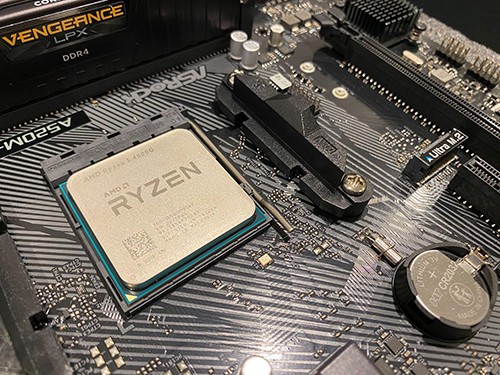
Expert Consulted: Adrian Gardiner. I’ve built many PCs using a range of different processor models, choosing carefully for the intended application, i.e., gaming for example. In this article I’ve used this experience to help show the benefits of each type of CPU, hopefully making it easier to choose.
Comparing the AMD Ryzen 3 vs Intel i5 CPU is not straight forward as there are many factors that first need to be considered, as you will discover when reading through this article.
From having built many desktop computers over the years I’m used to installing specific processors, from both AMD and Intel, in to my builds that I know will perform well for a particular set of client needs.
In addition to building new equipment, I also see a wide range of computers when visiting clients to troubleshoot their PCs and can clearly see the performance differences between certain types of installed processor.
Armed with this first hand knowledge, I can advise, depending on the application (i.e. gaming or general multitasking), whether you should select the AMD Ryzen 3 or Intel i5 processor.
Related Article: AMD Threadripper vs AMD Ryzen 9
AMD Ryzen 3 vs Intel i5 CPU Compared

The quick comparison chart below helps to show the AMD Ryzen 3 vs Intel i5 differences.
The AMD Ryzen 3 is a very capable processor and very competitively priced when pitched against the more premium Intel i5.
If you’re limited on budget I would plump for a Ryzen 3 but if you have the funds go for the more premium i5.
The Intel i5 can do everything the Ryzen 3 can do but with better multitasking and improved speed for not much extra money (depending on which i5 variant you choose).
Ryzen 3
- Released 2017 – now on 3rd generation CPU
- Originally targeted at Intel i3
- Entry level AMD CPU
- Up to 4 cores
- 8 threads
- DDR4 RAM 3200 MHz supported
- Integrated graphics (designated with a ‘G’)
- Good choice for budget gamers and general usage.
Intel i5
- Released 2009 – now on 13th generation CPU
- Designed to bridge the gap between the i3 and more powerful i7
- Mid range Intel CPU
- Up to 6 cores = better multitasking
- Up to 12 threads
- DDR4 – DDR5 RAM supported (depending on CPU model)
- Integrated graphics (for CPUs without the ‘F’ designation)
- Good for those looking for a more premium option and a better overall performance, particularly gaming.
Most Popular Computer Use

To be able to effectively judge which of the AMD Ryzen 3 and Intel i5 processors to choose, we first need to be aware of what people currently use their computer for.
As of 2022 (based on the most recent data I could find), here is a list of the current 5 most popular computer tasks used by most people, in order of popularity:
- Remote Work and Online Meetings: Due to the global shift towards remote work caused by the COVID pandemic, many users now having to work from home relied on their computers for teleconferencing, video calls, and managing work-related tasks using various collaboration tools and platforms, like Zoom, Skype and Teams for example
- Entertainment: Stuck at home, users turned to their computers for various forms of entertainment, including YouTube, streaming movies and TV shows, playing video games, listening to music, and browsing social media platforms like Facebook etc.
- Online Learning and Education: With the increasing availability of online courses, educational resources, and online face to face tutoring home users were able to use their computers for distance learning and attending virtual classes
- Communication: Computers were used for keeping in touch with their friends and family through email, instant messaging, and video calls on a range of platforms such as Zoom, Skype, and social media networks
- Content Creation and Hobbies: Many home users made good use of their computers for creative pursuits such as blogging, vlogging, photography, video editing, graphic design, and numerous other hobbies involving the plethora of digital tools and software now available.
Taking the above in to account, both the AMD Ryzen 3 and Intel i5 CPU can handle the these popular requirements very well.
However, the additional processing power from the i5 would make it a much more effective tool, especially for multitasking, for some of the more demanding applications, like gaming, video editing and graphic design in particular.
Overview of AMD Ryzen 3 vs Intel i5 Processors
Here is a brief overview of the Ryzen 3 and Intel Core i5 processors.
AMD Ryzen 3
The Ryzen 3 is an entry level processor, originally targeting the Intel i3 and designed as an affordable computing solution.
This quad core processor provides excellent performance for the price and is suitable for moderate office based tasks and casual gaming (provided that a CPU model with integrated graphics was selected – ‘G’ designation on the end of the model name).
It would be expected that most gamers would probably purchase a dedicated graphics card for enhanced gaming performance when selecting the Ryzen 3 for gaming.
Intel i5
The Intel i5 is a mid range and very popular CPU designed to bridge the gap between the entry level, lower powered i3 and high end i7 processors.
The i5 is a more versatile processor suitable for a wide range of tasks, including gaming, multitasking, streaming and content creation.
Performance Comparison
The main performance characteristics of each processor are shown below:
AMD Ryzen 3
- Generation: 3rd
- Smart Cache: 4 MB
- Base Frequency: 3.8 GHz
- Boost Frequency: 4 GHz
- Thermal Design Power Rating (TDP): 65w
- Cores: 4
- Threads: 8
Intel i5
- Generation: 13th (depending on model)
- Smart Cache: 23 MB
- Base Frequency: 2.9 GHz
- Boost Frequency: 4.3 GHz
- Thermal Design Power Rating (TDP): 95w
- Cores: 6
- Threads: 12
Explaining the Above Characteristics
Cores
CPUs contain ‘cores’ that fetch, read, and execute instructions. More cores mean better processing performance.
Computer programs use data strings called threads. Single-core processors handle one thread at a time and switch between threads to keep running.
Multicore processors, like “dual-core” or “quad-core,” were made to manage multiple threads at once, improving performance.
So, in summary, more cores and threads equal better performance and the ability to handle more tasks at the same time.
Threads
A thread represents a virtual CPU core and to create these virtual cores, Intel processors use hyper-threading, with AMD CPUs using simultaneous multi-threading (SMT).
Increasing the physical cores by creating virtual cores or ‘threads’ allows your CPU to handle multiple processes all at the same time, boosting performance.
Frequency
The ‘frequency’ or clock speed represents the number of cycles a processor can run in a second so the higher the clock speed, the faster the CPU can handle more instructions during a cycle.
Cache Size
Each CPU comes equipped with fast, integrated memory called ‘cache’. This cache memory is utilised by the processor to temporarily store instructions and data that may be required later.
Having a bigger cache size means better processor performance from minimising the time needed to access the temporarily stored information.
Value for Money

Taking the Ryzen 3 3200G and Intel i5 11400 (superseded by the more expensive 12400) as pricing examples (both of these models have integrated graphics):
The Ryzen 3 4300G is currently available for around $100 and the Intel i5 11400 for around $150.
For the respective performance available from each CPU, both of the above prices represent excellent value for money for what they can each do.
It all depends on what you’re looking for and whether your budget would stretch in this example to another $50 or so to get you a significant increase in performance.
Both the Ryzen 3 and Intel i5 come in a range of different options for you to choose to meet your budget.
Conclusion
Both the AMD Ryzen 3 and Intel i5 processors are excellent choices and which one you use will largely depend on your computing needs and of course budget constraints.
I’ve fitted a number of Ryzen 3 processors in to new desktop builds (non-gaming) for clients and have always been impressed by their performance, always in my experience noticeably faster than Intel i3 processors for example.
If you have the budget and plan on mainly gaming activities (as well as multitasking, streaming and content creation) go for the Intel i5 with it’s better overall performance.
I have clients running i5 based gaming computers with no issues at all, especially when running with a decent, dedicated graphics card.
If your budget is more constrained but you’d still like to game occasionally, together with moderate overall multitasking performance, the Ryzen 3 processor is a great, affordable option.
You could always upgrade your Ryzen 3 gaming experience later on by fitting a dedicated graphics card.

